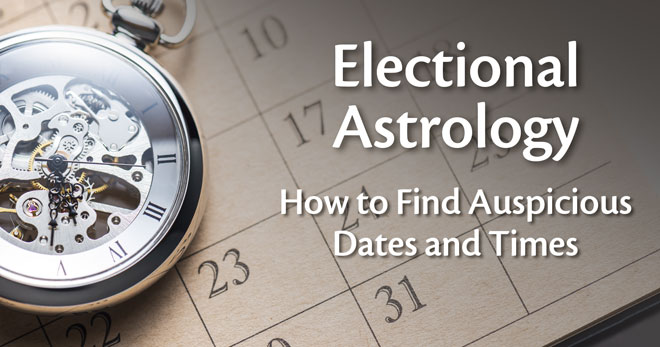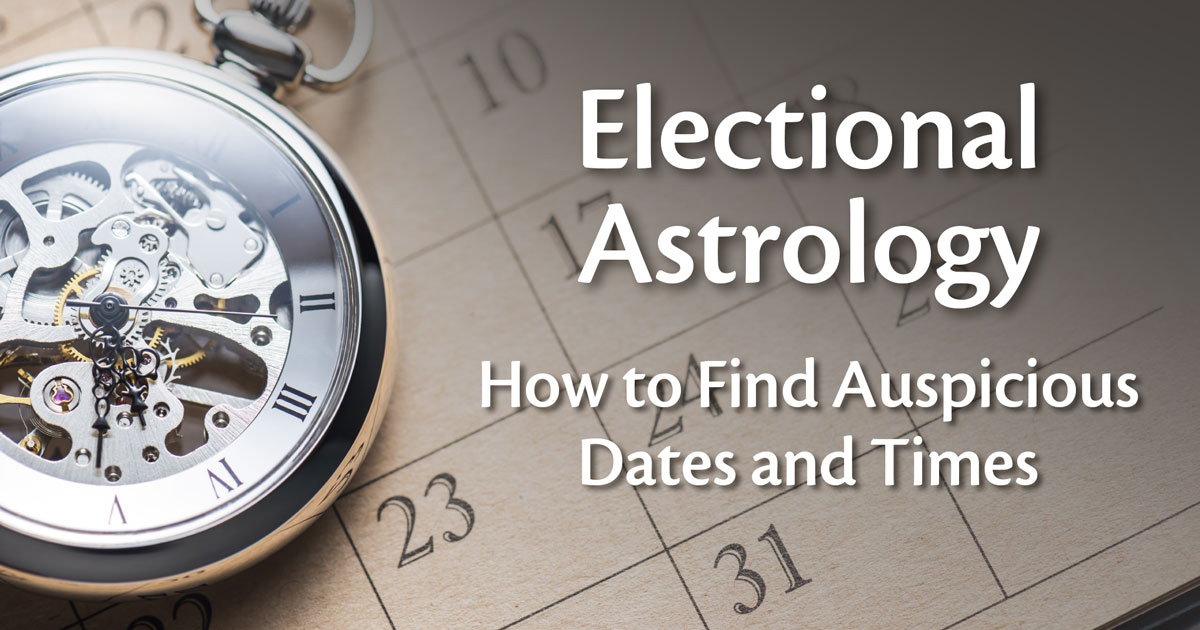
In episode 190 of the podcast astrologers Chris Brennan and Leisa Schaim provide an introduction to electional astrology, which is the application of astrology to find auspicious dates and times to begin new ventures and undertakings.
On the forecast episodes of the podcast we regularly feature an auspicious electional chart for the month ahead, but we realized recently that most listeners are not familiar with the rules of electional astrology, or how to use the charts we provide.
So we decided to do an entire episode on electional astrology, in order to provide a detailed introduction to the subject.
Since this is a big topic, the episode ended up being three hours long:
- In the first hour we set the stage by talking about the premise of electional astrology, and some conceptual and philosophical issues related to the topic.
- In the second hour we get into the technical details of what to look for and focus on when trying to find a good electional chart.
- Finally, in the last hour, we answer some questions about electional astrology that were submitted by listeners through Twitter.
This episode is available in both audio and video versions, and you will find links to both at the bottom of this page, just after the show notes.
Resources for Electional Astrology
Some other resources on electional astrology mentioned in this episode:
- The Electional Astrology Podcast – Our monthly podcast on elections for the month ahead
- Electional Astrology Course – Chris’ online course for learning electional astrology
Electional Astrology Podcast Outline
Here is our outline with the major points we touched on in this episode:
What is Electional Astrology?
- The premise of the “doctrine of origin.”
- The quality and future of anything can be determined by looking at the alignment of the planets at the moment it began.
- The potentiality of a system is embedded in the moment of its inception.
- Everything has a chart.
- Events and ventures can have birth charts, not only people
- Election simply means “choice.”
- Electional astrology involves proactively choosing a chart to begin something.
- If you can control the beginning then you can control the outcome.
- Distinction between inceptional and electional astrology.
- Original name for this branch was katarchic astrology, from the Greek katarchē.
History of Electional Astrology
- Probably originated in the Mesopotamian astrological tradition.
- Most cultures that develop astrology also develop something like electional astrology.
- Earliest and most influential treatment in western tradition is book 5 of Dorotheus of Sidon.
- Most later Hellenistic and Medieval treatments of elections based on Dorotheus
- Earlier fragments by Petosiris indicate earlier lost sources from 1st century BCE
- Horary astrology probably partially developed out of electional astrology eventually.
What Kinds of Things Can You Elect?
- In theory anything, but typically used for more important ventures
- Common uses: weddings, business incorporations, signing contracts, listing a house, etc.
- Can use it for smaller things still important to you: sending important emails, etc.
- Famous instances of electional astrology:
- The founding of Baghdad in 762
- John Dee elected the coronation chart for Queen Elizabeth I.
- Ronald Reagan’s astrologer Joan Quigley elected many major presidential events.
What Do You Do at the Electional Time?
- Typically the most symbolically significant initial act that begins whatever you are starting.
- Establish what the most symbolically significant beginning of the event is.
- What is the most important moment?
- Are there multiple beginnings, or just one?
- Examples:
- Saying “I do” and being pronounced married at wedding (begins marriage)
- Starting to write a book/article and saving draft.
- Opening doors for business for the first time.
- Leaving your house for a trip.
- Sometimes the thing that finalizes the beginning: sending a letter/email, saying “I do”
- If it’s possible, we try to do both start and finalizing actions, if more than 1, in same election.
- Focus on the moment of the most symbolic importance.
- Sometimes consider the conception versus birth issue from natal astrology.
- Ask yourself if this is a conception moment or a birth moment?
Philosophical Views on the Difference Electing Can Make
- May give you an edge, help something go more positively you were already going to do.
- Can’t really produce anything that your birth chart doesn’t at least suggest already.
- Can’t fully change your fate, but it may help in some small ways.
- Sometimes it helps just knowing what the outcome will be when you initiate an action.
General Approaches to Electional Astrology
- 1) Making chart as positive as possible overall based on fundamental astrological rules.
- 2) Making chart look similar to the venture you are starting.
- We usually do #1, while also paying attention to general significator and house of topic.
- Some ventures involve multiple houses, can be tough to make everything great at once.
- Optimize the good things, and try to minimize the bad or challenging things.
- There are no perfect charts.
- Electional is the art of learning how to prioritize what is most important.
First Steps: Defining Your Time Frame
- Clearly define the available time frame:
- e.g. June 1 – August 15, 2014.
- Between 9:00 AM and 5:00 PM.
- The more restrictions, the harder it is for you the astrologer. Fewer options.
- The fewer restrictions, the more work, because there are too many options.
- Only consider elections that fall within your available time frame.
- Anything outside of your available time frame does not matter. Ignore it.
- The challenge and skill of electional is learning how to make the best of what you have.
The Ruler of the Ascendant
- Ruler of the Ascendant and Moon are two most important factors in any election
- In our approach these two must be well-placed.
- The Ascendant, 1st house, and ruler of 1st represent the one who initiates the action.
- Primary planet that represents what was started at the inception of the venture.
- That which emerges or is born at that moment.
- We use whole sign houses, and traditional rulerships.
- Ensure that the ruler of the Ascendant is well-placed in your electional chart.
- Dignified by sign (domicile, exaltation, or mutual reception, ideally).
- Angular or in a good house that aspects the Ascendant.
- Aspected by benefics (Venus and Jupiter).
- Free from hard aspects from malefics (Mars and Saturn).
- Applying aspects indicate the future, separating aspects the past.
The Moon
- The Moon is the second most important significator in any electional chart.
- It acts as a general significator for the election as a whole.
- Ensure that the Moon is well-placed in the chart.
- In a good sign and house.
- Ruler of the Moon also in a good house.
- Old rule that Moon indicates the beginning, but the ruler the outcome.
- Applying to benefics.
- Not applying to hard aspects with malefics.
Angular Houses
- Planets in angular houses are more prominent and active in your electional chart.
- Emphasize benefics by making them more angular
- Minimize malefics, by making them less angular.
- Angular here means by whole sign house primarily, and secondarily by quadrant house.
- Whole signs for topics primarily, and quadrant houses for activity.
- Use sect to identify most positive and negative planets.
- Most positive planet by day: Jupiter, most negative: Mars
- Most positive planet by night: Venus, most negative: Saturn
- Really emphasize the most positive planet as much as possible.
- Be extra careful with and minimize/mitigate most neg planet as much as possible.
- Angular planets are most prominent in chart. Indicate the present, that which persists.
- Succedent houses next most prominent, indicate the future.
- Cadent houses least prominent, indicate the past.
- Mitigate planets that are poorly placed in cadent or bad houses.
- An aspect to the degree of an angle within 3 degrees, or to an angular planet.
General Planetary Significator of the Election
- If there is a planet generally associated with the topic, also make sure it is good.
- e.g. Venus for marriages, Mercury for communication.
- We tend to place more emphasis on the particular rather than general significators.
- Making general significators well-placed by sign can take much longer range planning.
Comparison with Natal Chart
- The electional chart acts as a permanent transit to your natal chart.
- Make sure that these are good transits that you can live with.
- We recommend finding a few possible elections, then use the natal chart as a tiebreaker.
- Use sect to identify natal transits to emphasize or avoid.
- Emphasize Jupiter and avoid close Mars transits for natal day charts.
- Emphasize Venus and avoid close Saturn transits for natal night charts.
- In the natal chart you focus on many of the same things as sensitive factors.
- The Ascendant, 1st house, and ruler of the Ascendant
- The Moon, especially by night, or the Sun by day.
- The other angular houses.
- The house that matches the topic of the election (e.g. 7th for marriage).
- Arguments exist about starting with the election or the natal chart first (discussed in ep 2).
- No one really ignores natal chart.
- Just a matter of exactly how much weight given to natal transits vs. electional chart.
- As people who do a lot of electional, we find it makes sense to start most of time with the elections, and then incorporate the natal.
- This makes sense partially from a workflow standpoint because it is difficult and time consuming to find good electional charts.
- In some instances this isn’t always the case, and there have been times that we used zodiacal releasing to narrow down a time span.
- In most instances you are not working with a very broad or ideal time frame where you can do a lot to control things like outer planet transits.
- This is why it often makes more sense to focus on the electional chart first.
Books on Electional Astrology
- Dorotheus of Sidon, Carmen Astrologicum, trans. Benjamin Dykes
- Choices and Inceptions: Traditional Electional Astrology, by Benjamin Dykes
–
Watch the Video Version of This Episode:
Here is the video version of this episode of the podcast:
–
Transcript
A full transcript of this episode is available: Episode 190 transcript
Listen to the Audio Version of This Episode:
You can either play this episode of the podcast directly from the website or download it as an MP3 to your computer by using the buttons below:
Podcast: Play in new window | Download (Duration: 3:09:54 — 130.9MB)
